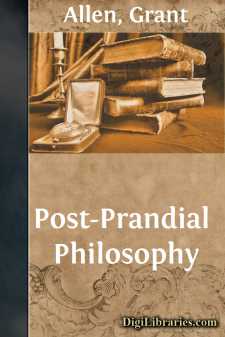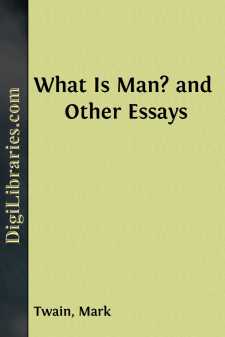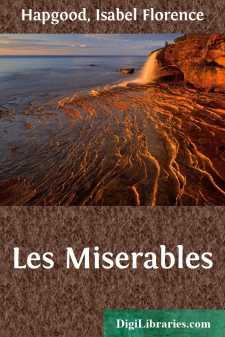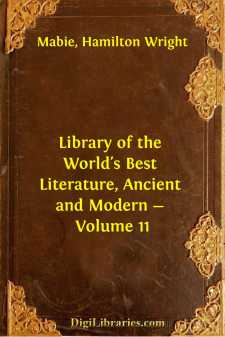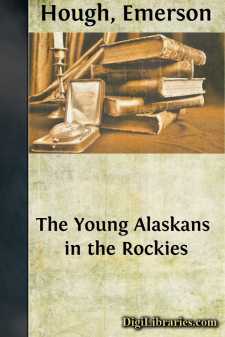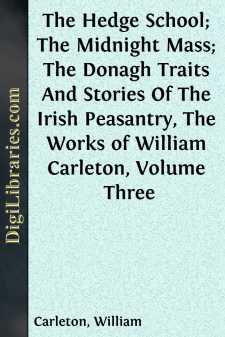Literary Collections
- American 84
- Ancient, Classical & Medieval 14
- Asian 1
- Australian & Oceanian 1
- Canadian 55
- Continental European 121
- English, Irish, Scottish, Welsh 179
- Essays 160
- General 24
- Letters 46
- Middle Eastern 1
Literary Collections Books
Sort by:
A TALE OF A LION RAMPANT It was in the month of May 1813 that I was so unlucky as to fall at last into the hands of the enemy. My knowledge of the English language had marked me out for a certain employment. Though I cannot conceive a soldier refusing to incur the risk, yet to be hanged for a spy is a disgusting business; and I was relieved to be held a prisoner of war. Into the Castle of Edinburgh,...
more...
by:
Grant Allen
THE STRUGGLE FOR LIFE AMONG LANGUAGES. A distinguished Positivist friend of mine, who is in most matters a practical man of the world, astonished me greatly the other day at Venice, by the grave remark that Italian was destined to be the language of the future. I found on inquiry he had inherited the notion direct from Auguste Comte, who justified it on the purely sentimental and unpractical ground...
more...
by:
Mark Twain
WHAT IS MAN? I a. Man the Machine. b. Personal Merit (The Old Man and the Young Man had been conversing. The Old Man had asserted that the human being is merely a machine, and nothing more. The Young Man objected, and asked him to go into particulars and furnish his reasons for his position.) Old Man. What are the materials of which a steam-engine is made? Young Man. Iron, steel, brass, white-metal,...
more...
by:
Richard King
FOREWORD BY SIR ARTHUR PEARSON, BART., G.B.E. Those who buy "Over the Fireside" will purchase for themselves the real joy of mentally absorbing the delightful thoughts which Mr. Richard King so charmingly clothes in words. And they will purchase, too, a large share of an even greater pleasure—the pleasure of giving pleasure to others—for the author tells me that he has arranged to give half...
more...
by:
Henry Coppee
Chapter I. The Historical Scope of the Subject. . . . . . . . . . Literature and Science. There are two words in the English language which are now used to express the two great divisions of mental production—Science and Literature; and yet, from their etymology, they have so much in common, that it has been necessary to attach to each a technical meaning, in order that we may employ them without...
more...
ABBOTT, JACOB (1803-1879). —Educationalist and miscellaneous author, b. at Hallowell, Maine, ed. at Bowdoin Coll. and Andover, entered the ministry of the Congregational Church, but was best known as an educationist and writer of religious and other books, mainly for the young. Among them are Beechnut Tales and The Rollo Books, both of which still have a very wide circulation. ABBOTT, JOHN STEVENS...
more...
CHAPTER I—M. MYRIEL In 1815, M. Charles-Francois-Bienvenu Myriel was Bishop of D—— He was an old man of about seventy-five years of age; he had occupied the see of D—— since 1806. Although this detail has no connection whatever with the real substance of what we are about to relate, it will not be superfluous, if merely for the sake of exactness in all points, to mention here the various...
more...
RICHARD HENRY DANA, SENIOR (1787-1879)Richard H. Danaichard Henry Dana the elder, although he died less than twenty years in 1787, in Cambridge, four years after Washington Irving. He came of a distinguished and scholarly family: his father had been minister to Russia during the Revolution, and was afterwards Chief Justice of Massachusetts; through his mother he was descended from Anne Bradstreet. At...
more...
by:
Emerson Hough
ROB, JOHN, AND JESSE IN CAMP “ Well, here we are, fellows,” said Jesse Wilcox, as he threw down an armful of wood at the side of the camp-fire. “For my part, I believe this is going to be about the best trip we ever had.” “That’s what I was telling Rob to-day,” said John Hardy, setting down a pail of water near by. “But I hope I won’t have to carry water up a bank a hundred feet high...
more...
by:
William Carleton
THE HEDGE SCHOOL. There never was a more unfounded calumny, than that which would impute to the Irish peasantry an indifference to education. I may, on the contrary, fearlessly assert that the lower orders of no country ever manifested such a positive inclination for literary acquirements, and that, too, under circumstances strongly calculated to produce carelessness and apathy on this particular...
more...



